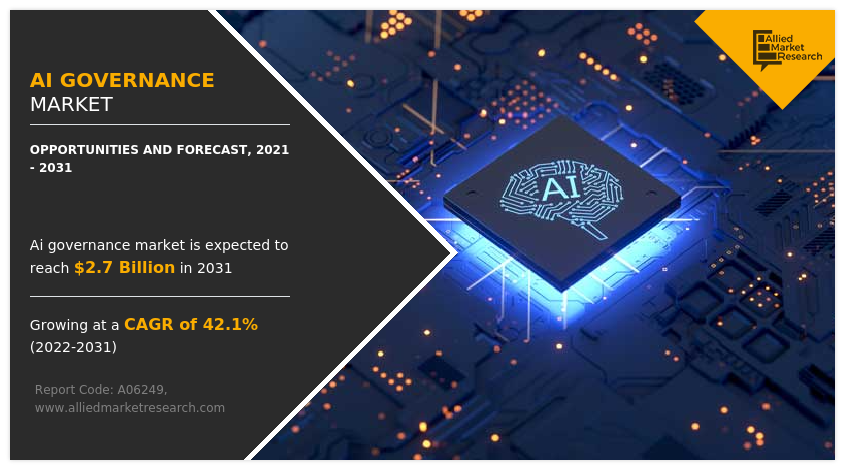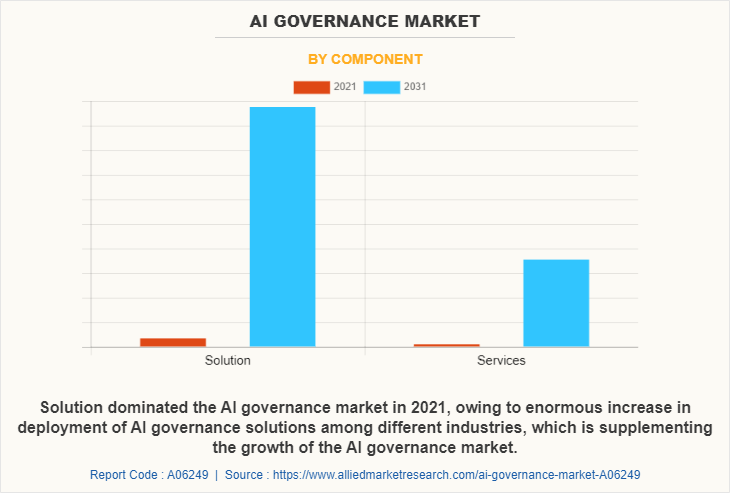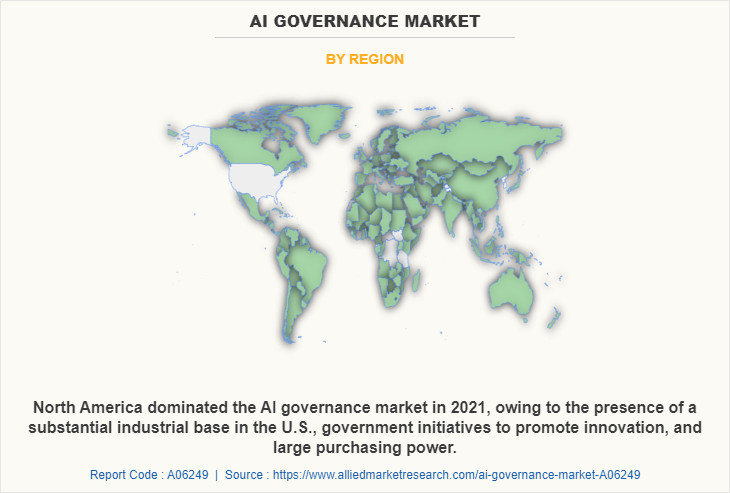AI Governance Market Insights, 2031
The global AI governance market size was valued at USD 80.8 million in 2021, and is projected to reach USD 2.7 billion by 2031, growing at a CAGR of 42.1% from 2022 to 2031.
Surge in governmental efforts to use the Al technology and quick and easy access to historical dataset and convenience of data storage primarily drive the growth of the AI governance industry. However, the foundation of thorough ethical standards for Al and inadequate expertise in Al are expected to hamper the AI governance market growth. Moreover, AI can significantly reduce discrimination based on gender and a higher level of adherence to technological regulation is expected to provide lucrative opportunities for AI governance market forecast.

Artificial intelligence (AI) is currently a technology with practical applications in contemporary life. AI technology can have a positive impact on economies and society when it is adopted and used properly. The expanding use of AI across a variety of industries, including healthcare, transportation, education, and others, has raised worries about public safety and security, driving the need for AI governance. The idea behind AI governance is that a legal framework should exist to guarantee that Machine Learning (ML) technologies are thoroughly investigated and methodically developed to help humanity accept AI technology fairly. Algorithm effectiveness, ROI (return on investment) risk, and bias are evaluated and monitored as part of AI (Artificial Intelligence) governance. The main objective of AI governance is to close the gap between ethical responsibility and technological advancement.
The global AI governance market is segmented on the basis of component, deployment mode, enterprise size, industry vertical, and region. On the basis of component, it is segregated into solutions and services. On the basis of deployment mode, it is segregated into cloud and on-premises. On the basis of enterprise size, it is segregated into large enterprises and small and medium-sized enterprises (SMEs). On the basis of industry vertical, it is segregated into BFSI, retail, healthcare, government and defense, media and entertainment, automotive and others. On the basis of region, it is analyzed across North America, Europe, Asia-Pacific, and LAMEA.
The key players operating in the AI governance industry include Amazon Web Services, Inc., QlikTech International AB, TIBCO Software Inc., Meta, SAP SE, International Business Machines Corporation, SAS Institute Inc., Salesforce, Inc., Microsoft Corporation and Alphabet Inc. Furthermore, it highlights the strategies of the key players to improve the AI governance market share and sustain competition.

Depending on component, the solution segment dominated the AI governance market share in 2021 and is expected to continue this trend during the forecast period, owing to enormous increase in deployment of AI governance solutions among different industries, which is supplementing the growth of the AI governance market. However, the services segment is anticipated to experience the highest growth, owing to increase in adoption of these services to help analysts identify useful insights, and aid natural language processing to automatically extract pertinent data from intelligence sources and establish links.

Region-wise, the AI governance market size was dominated by North America in 2021 and is expected to retain its position during the forecast period, owing to presence of a substantial industrial base in the U.S., government initiatives to promote innovation, and large purchasing power aiding the growth of the AI governance market. However, Asia-Pacific is expected to witness significant growth during the forecast period, owing to escalating demand for intelligent virtual assistants and the expanding 5G infrastructure. Furthermore, several major AI governance solution providers including Amazon Web Services, Inc., TIBCO Software Inc., Meta, SAP SE, International Business Machines Corporation, SAS Institute Inc., Salesforce, Inc., Microsoft Corporation and Alphabet Inc., are introducing new products & services to AI governance.
Top Impacting Factors -
Increasing Governmental Efforts to Use the Al Technology
Due to the expanding benefits of Al, businesses and governments worldwide are launching programs to adopt Al and ML technologies and establish themselves as industry leaders. To implement Al governance solutions, government organizations from many different nations are creating councils, creating new rules and guidelines, and creating frameworks. The main goals of governments implementing Al governance solutions are to safeguard civil liberties and personal information and to increase public confidence in Al technology. As a result, numerous businesses have established committees in cooperation with suppliers of Al solutions, academic institutions, and research facilities to identify risk issues for Al technology.
For instance, in March 2021, the U.S.-India Artificial Intelligence Initiative was launched by the Indo-U.S. Science and Technology Forum (IUSSTF) with the goal of fostering AI innovation through the exchange of knowledge and experiences, the discovery of fresh opportunities for bilateral cooperation, and the advancement of AI research.
Quick and Easy Access to Historical Dataset and Convenience of Data Storage
AI researchers and engineers need better data to enable better AI governance. The quality of an AI solution is determined by both the learning algorithm (such as a deep-neural network AI model) and the datasets used to train and evaluate that algorithm. Historically, AI research has focused much more on algorithms and datasets, due to their vital importance. AI governance is used by various industries to develop both online and offline capabilities to store their data and for real-time offer management, automated checkout systems, and improved behavior analytics. The demand for AI governance from data storage applications has also grown significantly over the last few years, owing to its easy access of dataset. For instance, in December 2021, Google, contributed to data-centric AI governance. Google Cloud is adding a new high value dataset to the Public Dataset Program, and Google researchers announced DataPerf, a multi-organizational effort to develop regulations for data quality and data centric algorithms. Such factors have propelled the AI governance market growth.
Regional Insights -
North America:
In North America, especially in the U.S., there is a growing focus on establishing federal regulations for AI governance. The U.S. government is working towards creating a national AI strategy that balances innovation with concerns around privacy, bias, and accountability. While the regulatory landscape is still evolving, the country’s approach leans toward fostering innovation with a light regulatory touch. Tech companies like Google and Microsoft have already implemented internal governance policies, emphasizing responsible AI usage and addressing public concerns over bias and misuse of AI systems.
Europe:
Europe is a frontrunner in AI governance, spearheaded by the European Union’s proposed AI Act. The EU is setting global standards by regulating AI systems based on risk categories, and enforcing stricter regulations for high-risk AI applications like healthcare, recruitment, and law enforcement. Additionally, Europe's General Data Protection Regulation (GDPR) influences AI governance by emphasizing data privacy and ethical AI usage. Countries like Germany and France are pushing for AI transparency and fairness to build responsible use of AI technologies.
Asia-Pacific:
In Asia-Pacific, China and Japan are leading AI governance efforts. China focuses on ensuring government oversight of AI to manage its societal impacts, including monitoring AI for social control. Japan, on the other hand, prioritizes innovation while promoting ethical AI usage. Japan's government is actively involved in developing AI guidelines to ensure fairness, accountability, and safety in AI applications.
Technological Trends
The idea behind AI governance is that a legal framework should exist to guarantee that Machine Learning (ML) technologies are thoroughly investigated and methodically developed to help humanity accept AI technology fairly. Algorithm effectiveness, ROI risk, and bias are evaluated and monitored as part of AI (Artificial Intelligence) governance. The main objective of AI governance is to close the gap between ethical responsibility and technological advancement. For instance, 8 out of 10 Americans, according to a study report from The Centre for the Governance of AI from June 2019, think AI and robots should be properly overseen.
However, according to Accenture Research, 82% of federal executives believe AI will collaborate with people as a trusted advisor and coworker over the next two years. The workforce will require high trust that AI governance might attain and fill the gaps to increase their faith in automated systems for regular life-changing decisions. Businesses and governments all over the world are taking a variety of actions to adopt AI and machine learning technology and establish themselves as AI governance market leaders because of the AI's expanding benefits. Government agencies worldwide are now creating councils, new standards and laws, and AI governance solutions. However, there are no suitable ethical guidelines because AI technology is still in its early stages and is undergoing constant AI development. The standardized application of laws and policies could be challenging to accomplish.
Key Benefits for Stakeholders
- This report provides a quantitative analysis of the market segments, current trends, estimations, and dynamics of the AI governance market analysis from 2021 to 2031 to identify the prevailing AI governance market opportunities.
- The AI governance market research is offered along with information related to key drivers, restraints, and opportunities.
- Porter's five forces analysis highlights the potency of buyers and suppliers to enable stakeholders make profit-oriented business decisions and strengthen their supplier-buyer network.
- In-depth analysis of the AI governance market segmentation assists to determine the prevailing market opportunities.
- Major countries in each region are mapped according to their revenue contribution to the global AI governance market.
- AI governance market player positioning facilitates benchmarking and provides a clear understanding of the present position of the market players.
- The report includes the analysis of the regional as well as global AI governance market trends, key players, market segments, application areas, and AI governance market growth strategies.
AI Governance Market Report Highlights
| Aspects | Details |
| Market Size By 2031 | USD 2.7 billion |
| Growth Rate | CAGR of 42.1% |
| Forecast period | 2021 - 2031 |
| Report Pages | 469 |
| By Component |
|
| By Deployment Mode |
|
| By Enterprise Size |
|
| By Industry Vertical |
|
| By Region |
|
| Key Market Players | TIBCO Software Inc., SAP SE, Alphabet Inc., Meta, Microsoft Corporation, Salesforce, Inc., SAS Institute Inc., International Business Machines Corporation, Amazon Web Services, Inc., QlikTech International AB |
Analyst Review
According to CXO's of leading companies, AI governance addresses topics including the right to information and potential legal infractions that may arise from improper usage of AI technology. The increased usage of artificial intelligence in various sectors of the economy has created a clear need for AI governance. Artificial intelligence is already widely used in the public safety, business, banking, healthcare, and transportation industries. The relationship between AI and justice, data quality, and autonomy are the three main areas of attention for AI governance. Compliance with technological rules will increase will spur market expansion. Additionally, the market for artificial intelligence (AI) governance will benefit from increased prospects due to the usage of AI to lessen gender bias and discrimination. Moreover, factors like transparency and trust-building in AI technology are becoming more important. Control over and access to personal data, as well as the role morality and ethics play in the use of artificial intelligence, are all addressed by AI governance. Furthermore, AI governance defines who is in charge of overseeing AI and how much daily lives can be altered and impacted by AI algorithms. Thus, the AI governance market is anticipated to prosper enormously in the forecasted period.
For instance, in October 2020, H2O.ai brought AutoML with Driverless Al to Equifax Ignite. The platform would enable Equifax Ignite users to easily build and deploy ML models.H2O Driverless AI automates time-consuming machine learning workflows with automatic feature engineering, model tuning, and model selection to achieve the highest predictive accuracy within the shortest amount of time. Equifax Ignite allows users to create analytical insights via end-to-end Equifax solutions or through modular microservices that support their existing technology platforms and workflows.
The AI governance market size was valued at USD 80.8 million in 2021, and is projected to reach USD 2.7 billion by 2031.
The global AI governance market is projected to grow at a compound annual growth rate of 42.1% from 2021-2031 to reach USD 2.7 billion by 2031
The key players operating in the market include Amazon Web Services, Inc., QlikTech International AB, TIBCO Software Inc., Meta, SAP SE, International Business Machines Corporation, SAS Institute Inc., Salesforce, Inc., Microsoft Corporation and Alphabet Inc.
Region-wise, the AI governance market size was dominated by North America in 2021 and is expected to retain its position during the forecast period.
Surge in governmental efforts to use the Al technology and quick and easy access to historical dataset and convenience of data storage primarily drive the growth of the AI governance market.
Loading Table Of Content...



